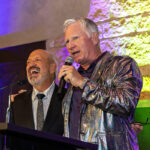
Woodward, Bernstein, Redford Visit Campus To Talk Watergate

Nearly 40 years — and thousands of journalistic layoffs — after two reporters brought down a president, could the media break a story like Watergate today?
Prominent contemporary journalists came together with the two who started it all, Bob Woodward and Carl Bernstein, on a UT stage Thursday to debate the issue — and by extension, the state of the fourth estate.
And oh, yes — Robert Redford weighed in, too. It was the 35th anniversary of the release of the movie that made the duo famous. Redford’s All The President’s Men inspired innumerable clever young Americans to go into journalism.
Woodward and Bernstein were candid at UT about how the long, dark investigation really went.
It started with a an aborted burglary at the Watergate office building (and the original note on which they scrawled “5 men arrested” is, like the rest of their papers, housed in the Ransom Center’s archives). It ended, of course, with the resignation of President Richard Nixon.
In the intervening months, the two used to have coffee every day in a vending-machine room off the Washington Post newsroom. After depositing his dime in the machine one day, Bernstein said he felt a chill down his back and thought, “Oh my God — this president will be impeached.”
He told Woodward, who said, “Oh my God — you’re right.”
And both agreed they could never breathe that word in or out of the newsroom. They kept doggedly on, cultivating sources they visited late at night and gathering documentation of a secret account linked to the highest levels of government.
As the wrongdoing was exposed, the press, judiciary, and political leaders each did their duty, Bernstein said. “I think what Watergate represents,” he said, “is the last time the whole system in this country really worked magnificently.”
In the years since, the strength of powerful newspapers like the New York Times and the Washington Post has ebbed. Media companies have become more profit-driven. Thousands of reporters have been laid off. Bloggers have seeped in. Partisan viewpoints have hardened.
And then the media let a presidential administration get away with going to war on faulty evidence. Or as College of Communication director Glenn Frankel put it: “Accountability journalism took a little bit of a holiday after 9/11.”
Even so, the panel seemed to agree that a modern exposé a la Watergate was possible. The New York Times‘ Peter Baker, who reported on the Clinton/Monica Lewinsky scandal, said frankly, “Could it happen today? Yes.”
“Every Tweeter would be there,” Woodward added.
But it would still take sustained digging to unearth deeper findings, added Dana Priest, two-time Pulitzer Prize winner of the Washington Post. “Investigative reporting can’t be done in the 24/7 news cycle that’s accelerating all the time,” she said. “It needs to ferment.”
Mark Miller, who left the East Coast journalism establishment to become editor of the Texas Tribune, said working for a nonprofit outlet has restored his hope in the investigative potential of American journalism.
“I am sad about what’s happened to the traditional outlets,” he said. “But I’m a lot more hopeful than I was probably a year ago. It took leaving….but I’m not as pessimistic as I was.”
Photo by Pete Smith. Courtesy of the Ransom Center.

















1 Comment